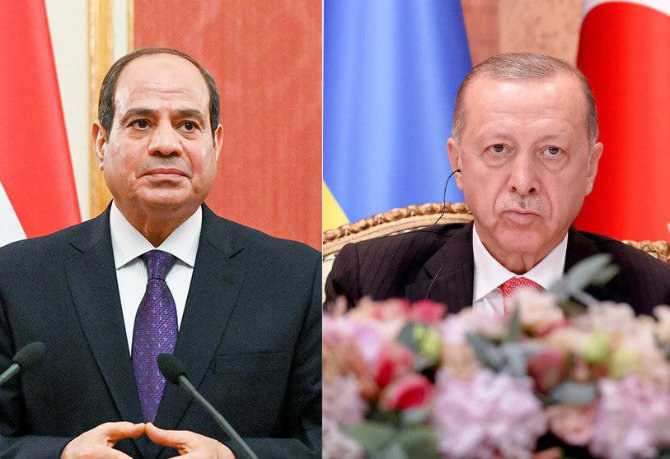Sudden U-turn in Turkiye-Egypt relations

https://arab.news/w9d8d
A sudden U-turn occurred last week in Turkiye-Egypt relations when Turkiye President Recep Tayyip Erdogan and Egyptian President Abdel Fattah El-Sisi met in Qatar and shook hands enthusiastically.
Nobody expected such a happy scenario so soon. The overjoyed smile on Qatari Emir Tamim bin Hamad Al-Thani’s face — who was standing in the background during the handshake — suggests that he was one of the major architects of this scenario. However, there were signs that, independently from the Qatari initiative, both Turkiye and Egypt were laboriously making efforts for such an encounter to take place.
The World Cup was a good occasion to arrange such a meeting because Erdogan was known as a football player during his younger years.
Turkiye-Egypt relations fluctuated for almost 10 years. The relationship ran into trouble when Erdogan refused to recognize El-Sisi’s government as legitimate. He used for El-Sisi a language that is not common at the level of heads of state.
There are several reasons for the sea change that is slowly taking place.
When Turkiye understood that tense relations with Egypt were causing considerable harm, Ankara decided to make an opening in relations. No enthusiasm was shown at the beginning by Egypt. After a long lull that lasted more than a year, Ankara renewed its initiative.
Three weeks ago, Egyptian Foreign Minister Sameh Shoukry disappointed Ankara when he gave a surprise interview to Al-Arabiya TV channel saying that Cairo had unilaterally suspended negotiations for the normalization of relations between the two countries. The reason was that Turkiye had not given any signal to change its Libyan policy.
While it was thought at the beginning that the normalization of Turkish-Egyptian relations might be postponed until an unforeseeable future, we were pleasantly surprised by this happy handshake. We have only limited knowledge about its background. A statement issued later by the Egyptian president’s office hailed this encounter “as a new beginning in ties with Turkiye,” thus confirming that something must have been brewing behind the scenes.
In the meantime, there was speculation that Cairo had long wished to set the scene for a handshake.
There are several reasons for the sea change that is slowly taking place between Ankara and Cairo.
Yasar Yakis
For his part, Erdogan had already given a signal that “there was no reason high-level talks should not take place between Turkiye and Egypt,” while the Egyptian side gave the impression that it had remained cooler about such an idea.
The Turkish and Egyptian leaders did not stop there. During their short encounter in Doha, they “confirmed the depth of historical ties between the two countries.” Last Monday, the Egyptian government issued a statement saying that this encounter would mark “the beginning of developing bilateral relations.”
Among three countries that Turkey had less-than-good relations with, namely Saudi Arabia, UAE and Egypt, it was Cairo that lagged behind. Now, relations with Egypt may also move toward a level comparable with the two others.
To counterbalance its declining relations with the Euro-Atlantic community, Turkiye needs to revive its relations with the countries of the region. Erdogan’s U-turn may also be linked to his need for foreign currency. Turkiye has achieved a serious thaw with Saudi Arabia and the UAE. The British daily, The Financial Times, on Nov. 23 wrote that Riyadh was discussing a deal to inject $5 billion into Turkiye’s central bank “with a view to shoring up Ankara’s foreign currency reserves and marking a further sign of rapprochement.” It added that the talks had not yet been concluded, but that they were in the final stages.
The steps that have already been taken in Turkiye-Egypt relations will probably be followed by an encounter between the foreign ministers. The two ministers have already met on the margin of various international meetings, but they were unofficial. Now the two foreign ministers are expected to meet with an official agenda. This will be followed by upgrading the level of diplomatic representation. Ankara had already sent an ambassadorial-level representative to Cairo, but he is called for the moment a "charge d’affaires" until both sides formally complete the upgrading formalities.
Egypt says that trade was not negatively affected by the deteriorating relations, but with the normalization trade volume may be expected to rise. Turkiye’s strong electrical household appliances company Arcelik is planning to make a major investment that might create 60,000 jobs in Egypt.
Now that the two heads of states have given their blessing with a handshake, the rest will probably follow.
• Yasar Yakis is a former foreign minister of Turkiye and founding member of the ruling AK Party.
Twitter: @yakis_yasar










































